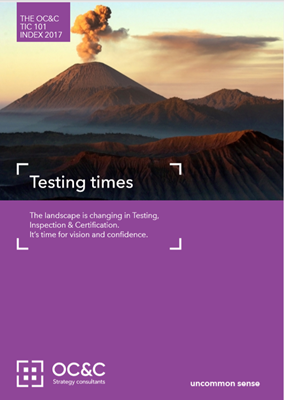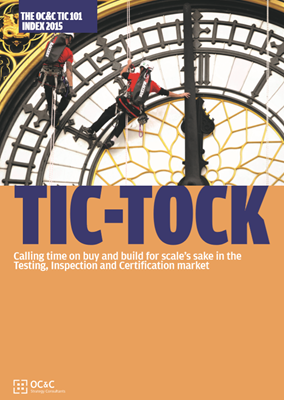Can TIC solve climate change?
Wednesday 10 July 2019Article
Can TIC (Testing, Inspection, and Certification) providers solve climate change? The short answer is no.
At least they can't solve it on their own. This is a global issue that needs collaboration on an unprecedented scale. But, as a recent study commissioned by the TIC Council shows, they will have a critical role to play helping industries across the globe to tackle the increasingly apparent risks it poses for them.
At the recent TIC Council conference in Brussels this research was presented by Michael Fubi (CEO of TUV Rheinland and President of the TIC Council). It was remarkable to see not only how prominent the risk now is in the minds of the 400 C-suite execs they interviewed (it is now one of the top 3 risks next year alongside cyber security and disruptive technology, having been outside the top 10 last year) but also how unprepared they feel, with 55% of respondents feeling less resilient against climate risk than they did last year. This is a message that is consistent across industries - from automotive & transportation to food & agriculture, and from consumer goods to energy & utilities - and also felt keenly in every continent.
So what's different here from other risks? What is it about sustainability and climate change as a risk to be understood and mitigated that means CEOs feel it has caught them off guard?
In part it is because the impetus to change has come from the ground up not top down. It is the rapid change in consumer behaviour, whether cutting out plastic or switching to electric vehicles (or no vehicles at all), and the demand to prove action above and beyond the basic CSR tick-the-box approach that has made it so much more prominent. Yes, much of the risk is supply-chain led, ensuring security of supply of raw materials and energy, but these risks have been understood for a while, whereas it is consumers proving they are willing to put their money where their mouth is that has made this a far more real risk across the C-suite. As keynote speaker Elena Visnar Malinovska reminded the audience in Brussels, "Major innovations are often social ones not just technical ones".
But the other major difference now is that the pace of change is far faster than regulation can catch up with. It has been too easy historically for companies to assume that complying with local regulations and ISO certifications is sufficient to manage their environmental risks. Yet it takes 10 years for an ISO standard to be developed and rolled out and even longer for state regulations to catch up, which simply isn't quick enough compared to the pace of technological development or the need for behavioural change in a "climate emergency". And consumers are losing patience with the ability to drive change of international regulators, distracted as they are by current high profile acts of jingoistic self-immolation. As Michael Fubi later observed "There is an important difference between voluntary vs regulatory requirements, and climate change certification has a role in both".
The good news (for TIC players at least!) is that there is a really important role for them to play here, with 76% of execs explicitly saying they'd trust independent third party testing, inspection and certification companies to assist in reducing climate risks.
They have the capabilities. They have the technical expertise. They have the all-important brand. But the challenge will be that the way they support their customers will need to change to make the most of this opportunity across three dimensions:
Firstly, they will need to get better at understanding the end-customer needs and concerns, rather than just waiting for regulation to generate demand for them. This has always been a challenge for organisations which have been built on engineering expertise and who have only recently pivoted to more customer-centric business models, but one that will become bigger as their role will increasingly be to educate their immediate customers on what their risks are and how to mitigate them. As expressed in a previous post I wrote about TIC coming up "above the radar" and being relevant to C-suite execs, it means that the winners will need to be able to provide C-suite propositions rather, than be "order-takers".
Secondly, they will need to work out which of these new areas of demand can actually be monetised. Xue Ming, VP for Western Europe at Huawei, had a warning for the TIC Council members, as a customer of theirs: "Who will buy? What will consumers actually spend on?", which is a good reminder of the importance of developing services that actually solve a problem worth paying a premium for - whether that is a climate change certification, an ethical supply chain mark, or a promise to provide end-to-end visibility of the food chain.
And thirdly, solving this particularly complex global problem will require teamwork. TIC players will need to facilitate collaboration and data-sharing between players across the value chain to really deliver on the promises of reduced resource consumption. We frequently hear stories of well-intentioned schemes that appear sensible in isolation, but which achieve completely opposite outcomes to those intended. For instance, materials used in "zero-carbon" buildings made of concrete with more embedded carbon than would be consumed in decades of heating and lighting; or replacements for plastic packaging that reduce single-use-plastic but increase energy consumption. Data security issues and competitive concerns have often been used as an excuse to not to collaborate more effectively in the past, but that excuse is fast running out.
Ultimately, there is both opportunity and existential threat here for TIC players. As the established voice of trust in industries across the world with unparalleled brands, they are best placed to help fix the well-publicised Climate Emergency… and if they don't, they risk not just missing out on a lucrative commercial opportunity but, perhaps more importantly, undermining their reputation and role in the global economy and, ultimately, their right to exist.


